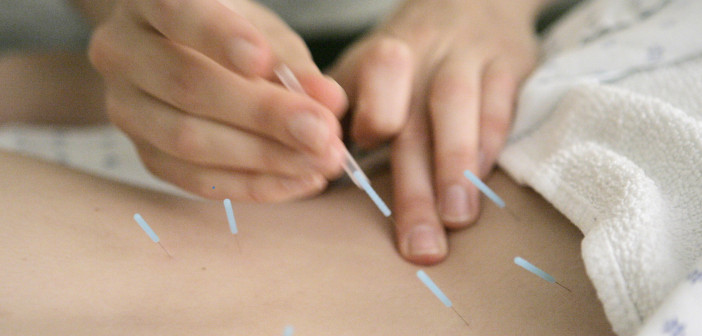What is Acupuncture?
Once you have seen acupuncture in action, it is an image that is hard to forget: a patient lying on a table face-down with a number of needles in their back and limbs, while a practitioner gently inserts or removes needles as they see fit. Far from being a holistic medicine custom-made for masochists, acupuncture has its roots in traditional Chinese medicine. In the canon of Chinese medicine, acupuncture is a method of correcting imbalances in the flow of one’s qi, or personal energy. By inserting needles into the skin at certain junctures, this treatment is believed to rectify these disruptions in the flow of qi and thus hasten the healing process from disease or injury. While there are certainly practitioners of traditional Chinese medicine to this day, acupuncture is also sought out by people from all walks of life as – perhaps ironically – a treatment for chronic pain. Western practitioners may hope the stimulating effect of acupuncture on the body’s muscles and nervous system will improve the body’s natural pain response mechanisms, thus allowing a patient to cope with pain while avoiding potentially addictive prescription drugs.
How Effective is Acupuncture?
Setting aside issues of qi imbalances for the moment, is acupuncture an effective means of managing pain or other symptoms of chronic diseases? Based on a survey of studies related to acupuncture by the National Institute for Health (NIH), much of the current research into the effectiveness of acupuncture is inconclusive. In general, the NIH has found it difficult to compare across studies and attain any kind of big-picture review of the success of using acupuncture in a medical context. However, there are some conclusions that can be drawn from the existing literature. Some promising results for using acupuncture for pain management have been found for patients suffering from carpal tunnel syndrome; fibromyalgia; headaches; pain in the lower back, neck pain, and myofascial pain; osteoarthritis; pain following dental procedures; and tennis elbow (more officially known as lateral epicondyle). However, it must be noted that the research into acupuncture for many of these cases is relatively scant, and is sometimes mixed as to acupuncture’s actual effectiveness. Researchers have also noted that a patient’s receptivity towards acupuncture may have an influence on the pain relief gained by its practice: that is, those patients who were more enthusiastic about acupuncture in the first place reported greater pain relief from its usage. In any case, the existing material concerning acupuncture for pain management shows that is has promise as an alternative medicine, but it also demands more rigorous research to verify this.
Is Acupuncture for Everyone?
The decision to use acupuncture as a method for dealing with chronic pain mostly comes down to personal attitudes and receptivity towards an alternate medicine. As summarized above, existing research – though largely mixed – does show some promise for acupuncture as a method worth trying if other pain management techniques have been ineffective. XUwellnesscenter.com adds that, “As with any health procedure, a doctor should be consulted before employing acupuncture. The risks for acupuncture by and large are very minimal, though there have been instances of such serious adverse side effects such as infections or punctured organs. These risks can be best avoided by only visiting an established and well-respected acupuncture practitioner.” Many people opt for acupuncture in their pain management plan because it is a way to, ideally, rely on a more natural response to pain relief and avoid the serious side effects (including risk of dependency) of treatments such as steroids or prescription pain medications. Those who are interested in future research into acupuncture should note that the NIH National Center for Complementary and Alternative Medicine is funding a number of trials into the efficacy of acupuncture for pain relief, which should expand background research on acupuncture even further.




